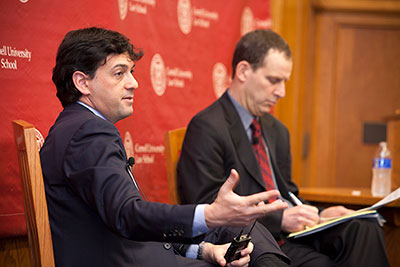Law professor debates gun control
By Mikhail Yakhnis

In the wake of the shooting at Sandy Hook Elementary School in Newtown, Conn., that left 20 children and six adults dead, gun control has again gained traction in popular and political discourse. Numerous calls to action have been issued, including statements made by New York City Mayor Michael Bloomberg and President Barack Obama. As the debate grows, legal experts – including those at Cornell – have been weighing in on the conversation, offering their own views and interpretations of the Second Amendment.
Michael Dorf, the Robert S. Stevens Professor of Law and a noted Constitutional scholar, debated attorney Alan Gura ’92 at Cornell Law School Jan. 29 on the Constitutional and legislative merits of gun control. Gura argued before the Supreme Court in the 2008 District of Columbia v. Heller case, which led to a landmark decision saying that the Second Amendment protects individuals’ right to keep and bear arms for self-defense.
“The Newtown, Conn., massacre … may have so changed the political landscape in America that gun-control laws that could not have been enacted just weeks ago are suddenly under discussion,” Dorf wrote in an essay published Dec. 26 at Justia.com. “But what about much more serious restrictions? Suppose that the political will developed for a ban on private possession of firearms in all public places? Would such a law – enacted at the federal, state or local level – contravene the Second Amendment as interpreted by the Supreme Court? The answer is not entirely clear.”
In his opening remarks, Gura agreed, noting, “I’d like to focus on the one issue that I see as probably being the next major issue that the Supreme Court is going to have to resolve and that’s the issue of bearing arms: carrying handguns for the purposes of self-defense outside the home.”
He disputed the notion that the courts have been silent on the issue, instead arguing that the Heller case told us a great deal. “If you recall, the city of Washington had as its primary defense this idea that the Second Amendment related to a collective militaristic right … to carry guns. In support of that theory, they looked to the term ‘bear arms’ and said it had a uniquely militaristic meaning.” The Supreme Court ruled in Hellerthat “bear arms” had the same primary meaning at the time of writing as it does now: to carry or hold, he said.
Dorf said such strict “historical” interpretation of the Second Amendment would protect the right to armed revolution by the states. The “insurrectionist” view of the Second Amendment “is both historically accurate and crazy,” Dorf said, and discredits modern gun rights advocates’ opportunistic use of history.
Gura, for his part, noted the theory might be better phrased, asking “What about [calling it] the American Revolution Theory? How many people here, show of hands, think the American Revolution was a good idea?” Everyone present raised their hands. “Ok, still popular,” he said to laughs.
Gura concluded: “We have enjoyed a couple hundred years of stable, peaceful democracy in a very diverse nation where a lot of people have different ideas about things. And, I would suppose that the Second Amendment provides some of that stability.”
Mikhail Yakhnis '14 is a writer intern for the Cornell Chronicle.
Media Contact
Get Cornell news delivered right to your inbox.
Subscribe